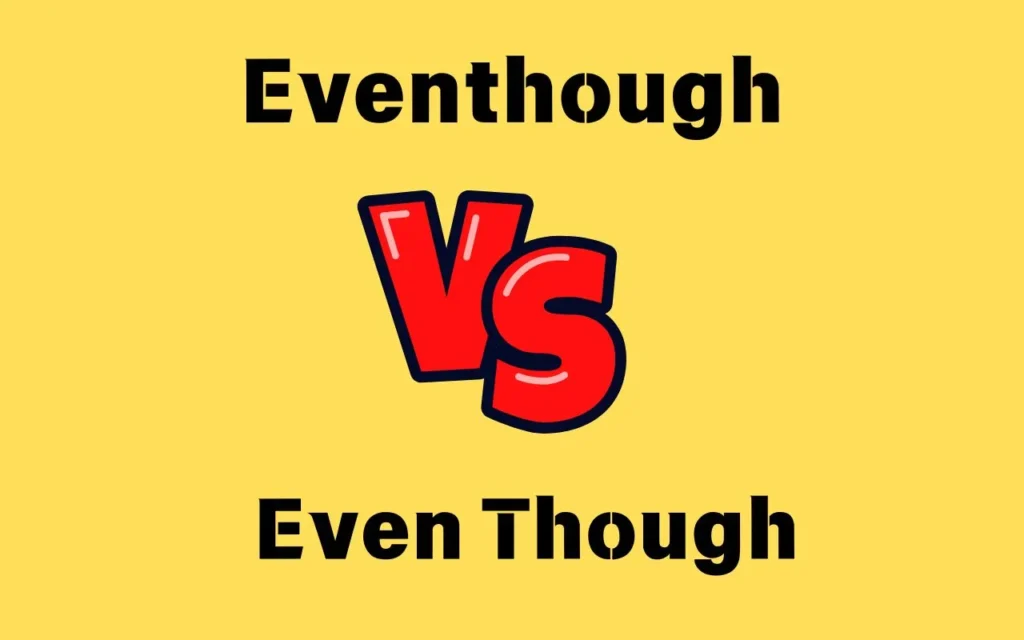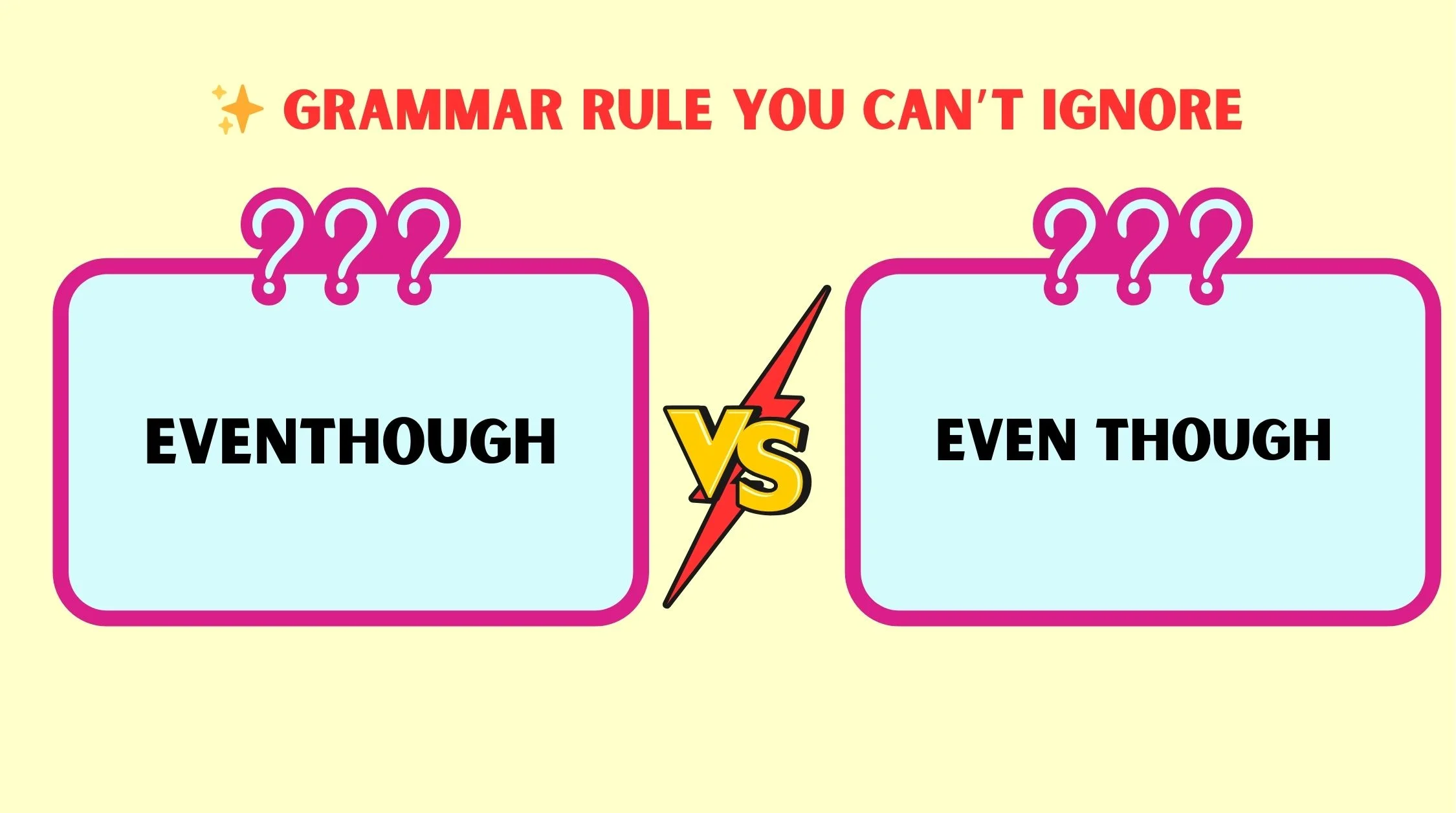Last updated on September 29th, 2025 at 10:51 am
English is full of phrases that look like they should exist but don’t. One of the most common offenders is “eventhough.” At first glance, it feels like it belongs in the language. After all, we join words all the time—“everyday,” “anymore,” “nowadays.” So why not “eventhough”?
Here’s the truth: “eventhough” is never correct. The correct form is always “even though.”
That sounds simple, but there’s a reason so many people keep typing it wrong. In this article, we’ll dive deep into why “eventhough” is incorrect, how to use “even though” naturally, and practical tricks to avoid mistakes.
Understanding the Confusion: Why “Eventhough” Looks Plausible

If you’ve ever typed “eventhough,” you’re not alone. The mistake happens because:
- We often pronounce “even though” quickly, making it sound like one long word.
- English already has examples of words that started as two words but fused together (e.g., “every day” → “everyday”).
- People tend to trust their ears over their eyes when spelling.
It doesn’t help that autocorrect sometimes misses the error. Add in casual texting culture, and “eventhough” spreads fast.
Think of it like hearing a song lyric wrong and singing it confidently for years—until someone points out what it really says.
Grammar Rule: Why “Even Though” Is the Only Correct Form
Here’s the rule: “even though” is a concessive conjunction. That means it introduces a contrast or unexpected result, similar to “although” or “despite the fact that.”
- Correct: Even though it was raining, we went hiking.
- Incorrect: Eventhough it was raining, we went hiking.
Unlike words such as “everyday,” which evolved into a single word, “even though” has never been accepted as one word in any dictionary, grammar book, or style guide.
Origin & Historical Usage of “Even Though”
The phrase “even though” dates back to Middle English. Both “even” and “though” were used separately long before they were paired.
- “Though” has roots in Old English (þēah), meaning “nevertheless” or “however.”
- “Even” has long been used for emphasis, meaning “just” or “exactly.”
When combined, they formed a phrase that emphasizes contrast. Unlike “anymore” or “already,” this pair never fused into one word historically. That’s why “eventhough” has no linguistic basis.
Why “Eventhough” Is Always Incorrect
Every major English authority rejects “eventhough.” That includes:
- Oxford English Dictionary
- Merriam-Webster
- Cambridge Dictionary
- Chicago Manual of Style
Type “eventhough” into Word, Google Docs, or Grammarly—you’ll get a red underline every time.
Still, you’ll find it on social media, in casual chats, and sometimes even in blog posts. Just because it exists in writing doesn’t mean it’s right.
The Cost of Using the Wrong Form
Does it really matter if you type “eventhough”? Yes—context decides how serious the mistake looks.
- In professional settings: Writing “eventhough” in a cover letter, report, or client email can make you look careless.
- In academics: Professors and examiners mark down grammar mistakes in essays or theses.
- In SEO writing: Google prefers clean, authoritative text. Misspellings reduce credibility and ranking potential.
A small mistake can create a big impression. Think of it like showing up to a job interview with mismatched shoes.
Myths and Misconceptions About “Eventhough”
Some people argue, “Language evolves—maybe one day ‘eventhough’ will be correct.” That’s unlikely.
Why? Because:
- No dictionary or style guide shows evidence of adoption.
- The phrase isn’t simplifying language. Writing “even though” is already short and clear.
- Similar phrases (“as if,” “in spite of”) remain separate words despite centuries of use.
So while texting slang like “gonna” or “lemme” may gain informal acceptance, “eventhough” stays outside the rules.
Usage in Context: How to Use “Even Though” Naturally
“Even though” introduces contrast. Here’s how it looks in real life:
- Even though I was tired, I finished the project.
- She smiled, even though she was nervous.
- He kept playing, even though it started raining.
To make it crystal clear, here’s a comparison table:
| Incorrect (❌) | Correct (✅) |
|---|---|
| Eventhough I studied, I failed the test. | Even though I studied, I failed the test. |
| She came late eventhough she promised. | She came late, even though she promised. |
| Eventhough it’s cheap, I won’t buy it. | Even though it’s cheap, I won’t buy it. |
Common Mistakes and Fixes
Here are the most frequent errors:
- Writing it as one word → Fix: Always two words.
- Dropping “even” → Though it rained, we went out is fine, but it’s not the same as “even though.”
- Overusing it → Too many “even though” sentences can make writing clunky.
Before-and-after example:
- ❌ Eventhough I wanted coffee, I drank tea. Eventhough it was late, I stayed up. Eventhough I was tired, I worked.
- ✅ Even though I wanted coffee, I drank tea. Later, even though it was late, I stayed up. Eventually, despite being tired, I kept working.
Notice how variety keeps the flow natural.
Pronunciation vs. Spelling: Why the Ear Tricks the Eye
Say this quickly: “Even though it’s cold, I’ll go outside.”
Sounds like one long word, right? That’s why “eventhough” pops up so often. Our ears merge sounds when we speak fast.
But spelling must follow grammar rules, not pronunciation. Otherwise, we’d also write:
- “gonnago” instead of “going to go”
- “dunno” instead of “don’t know”
Those spellings belong in informal texting, not standard English.
Global Perspective: Do Other Languages Combine Similar Phrases?
Yes, but English works differently.
- In German, long words are often merged: obwohl (although) literally means “whether-though.”
- In Spanish, phrases like aunque combine “aunque” (although) into one word.
- In French, bien que stays separate, just like English “even though.”
So while other languages sometimes merge, English hasn’t with “even though.”
The Digital Factor: Autocorrect, Spellcheck & Internet Language
Technology plays a role in spreading errors:
- Autocorrect: Sometimes ignores “eventhough” because it looks similar to “although.”
- Predictive text: Phones suggest “eventhough” based on frequent typing patterns.
- Internet culture: Social media rewards speed over accuracy. If you’re typing fast, mistakes spread.
Ironically, the very tools designed to help us sometimes reinforce errors.
Tricks to Remember the Correct Form
Want a quick way to stop writing “eventhough”? Try these mnemonics:
- Think of “even if, even when, even though” → all two words.
- Imagine the word “evening.” You wouldn’t write “eventing.” Same logic applies.
- Visual trick: Write it as EVEN + THOUGH in bold or uppercase when practicing.
The more you train your eyes, the less your ears will trick you.
Quick Grammar Check: Alternatives to “Even Though”
Sometimes, you don’t need “even though.” Other options include:
| Phrase | Usage Example |
|---|---|
| Although | Although it rained, we played soccer. |
| Though | Though he was late, he apologized. |
| Despite | Despite the cold, she went swimming. |
| In spite of | In spite of the delay, we arrived on time. |
Tip: “Even though” adds stronger emphasis than “although” or “though.”
Real-Life Applications: Fixing Your Writing Instantly
If you catch yourself typing “eventhough,” here’s how to fix it:
- Search your document for “eventhough.”
- Replace all with “even though.”
- Read aloud to make sure it flows naturally.
Example fix:
- Original: Eventhough it was snowing, they went outside.
- Fixed: Even though it was snowing, they went outside.
Simple, effective, and instantly correct.
Why It Pays to Get It Right
Mastering small details like this makes a big difference. When you consistently write “even though” correctly:
- You sound professional and credible.
- Readers trust your message.
- Employers, teachers, and clients see you as detail-oriented.
Correct grammar isn’t about being a perfectionist—it’s about showing respect for your audience.
🙋 FAQs
What is the difference between “eventhough” and “even though”?
“Eventhough” is always incorrect, while “even though” is the only correct form used to express contrast.
Is “eventhough” ever accepted in English?
No, dictionaries and grammar authorities do not recognize “eventhough” as a valid word.
Can I use “even though” in formal writing?
Yes, “even though” works in both formal and informal writing to show contrast.
What are some alternatives to “even though”?
You can use “although,” “though,” “despite,” or “in spite of,” depending on the context.
Why do people mistakenly write “eventhough”?
It happens because in fast speech, “even though” sounds like one word, tricking the ear and influencing spelling.
How can I remember to write “even though” correctly?
Use memory tricks like “even if, even when, even though” — all are always two words.
Conclusion
At the end of the day, the Eventhough vs Even Though debate isn’t really a debate at all. One is a common mistake, and the other is the only correct choice.
Remember:
- Always two words → even though.
- Use it when showing contrast.
- Avoid the trap of letting your ears decide your spelling.
So next time your fingers want to type “eventhough,” pause, separate the words, and keep your writing sharp.
